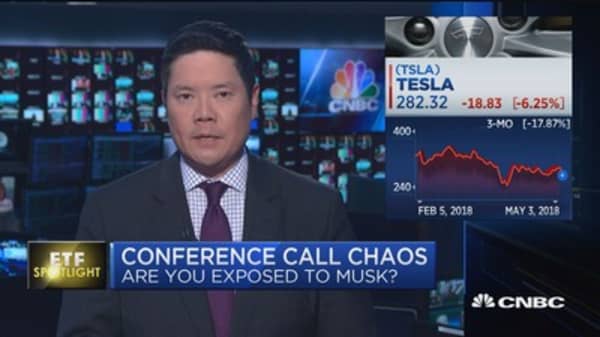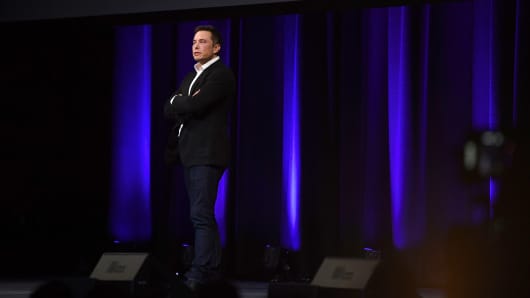On Friday morning, Musk did take to Twitter, but not with anything resembling an apology. He explained that the analysts he attacked on the call don't represent investors but short sellers and the "short thesis" was behind their questions.
Lukomnik at investor watchdog IRRC expressed some sympathy for Musk's frustration with questions about issues like quarterly gross margin. He said more CEOs should work to change the narrative and focus on the "strategic pan," and "investors could help by asking those types of questions, but right now the general dynamic is a short-term 'did you meet your quarter, what is guidance?'"
But Musk, having over-promised and under-delivered on key milestones while burning cash, isn't the best CEO to play that "strategic pan" role right now.
The truth is, even though Tesla's 2010 IPO was considered a success, there's a part of Tesla management that still regrets having to go public. Comments given over the years by Tesla CFO Deepak Ahuja illustrate how the company feels about the quarterly dance. Speaking last year to an audience in India, he said, "An IPO is just a milestone in the journey; it's not the end at all. It just makes life difficult. You've got to start delivering every quarter, which is quite painful compared to having slightly longer term strategy and vision and the right investors who go along with that ride."
Ahuja also explained why the company went public. "It was the best way to get capital at the lowest cost possible."
Ahuja explained that unlike most Silicon Valley start-ups, being an automotive company means having an asset-intensive, brick-and-mortar business model that venture capitalists aren't likely to back. "We knew we needed billions of dollars, and no VC in the Valley was going to give us even $100 million, because they're just not used to funding brick-and-mortar companies like Tesla."
Morgan Stanley's research team issued its own statement of annoyance: "While they may be 'dry' in nature, we argue such questions are extremely important for a highly levered and cash hungry company with 2025 bonds trading at 89. ... Feedback we have received from investors during and following the call support this view. ... an important part of Tesla's success has been its relationship with the capital markets in funding its ambitious plans. The analysts on the call represent the providers of capital that Tesla has throughout its history depended upon."
The shorts — which recently ratcheted up short interest in Tesla to 30 percent of its publicly available shares — are smelling blood.
Some of the things Musk said are good reminders about long-term investing for individuals:
- "The problem is that people get too focused on what is happening in the space of a few weeks, or a few months. It is an old maxim of investing: You should not be focused on short-term things, you should be focused on long-term things."
- "We have no interest in satisfying the desires of day traders, we could care less — please sell our stock, don't buy it."
- "If people are concerned about volatility, they should definitely not buy our stock. ... Do not buy it if volatility is scary."
All true, but better said by a Warren Buffett or Jack Bogle when preaching the benefits of investing in broad index funds, not a single, highly levered stock that recently saw its bonds downgraded by Moody's and its credit situation switched from "stable" to "negative."
Tesla is not even the Tesla version of an index fund.
There remain many things about Tesla that the Larry Finks of the world like. Fink didn't stop writing letters after his 2016 missive on long-term investing. Last year Fink wrote a letter calling on all investors to support corporations that promote social change.
"Increasingly, ownership lies with index funds and others who express their opinions through engagement, proxy voting and other stewardship tools, rather than buying and selling," IRRC's Lukomnik said. "But the ethos of the calls hasn't changed to meet the needs of these universal owners, who may, in fact, have a longer-term perspective. For example, ESG/sustainability issues rarely get mentioned. Yet you see the Blackrocks and State Streets of the world saying they care about those issues as active owners."
Musk and Ahuja are trying to accomplish a lot more than your average index fund or ETF, or Silicon Valley start-up. "There has been no successful American car company in 100 years, and then to make it an electric car company in California that is vertically integrated in its manufacturing, and wants to challenge the dealership network, and do its own sales and service; that's an incredibly hard thing to take on."
But once you take the money, to expect to be able to run is, even for Musk, asking for too much credit.
More from ETF Spotlight:
Saudi Arabia and Egypt are the world's best ETF markets in 2018
Gundlach's new energy ETF bet could be a gusher
Many investors already think there will be no gain this quarter





















